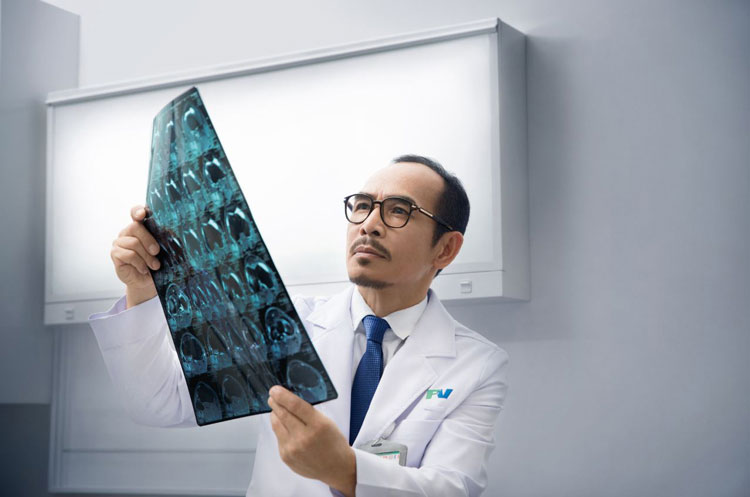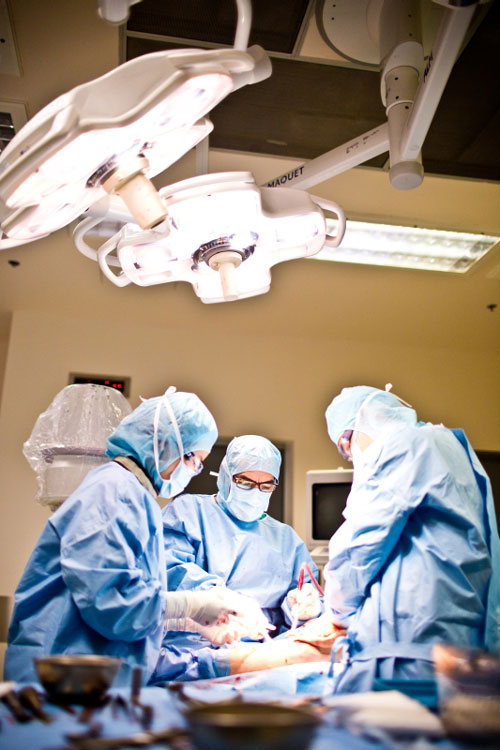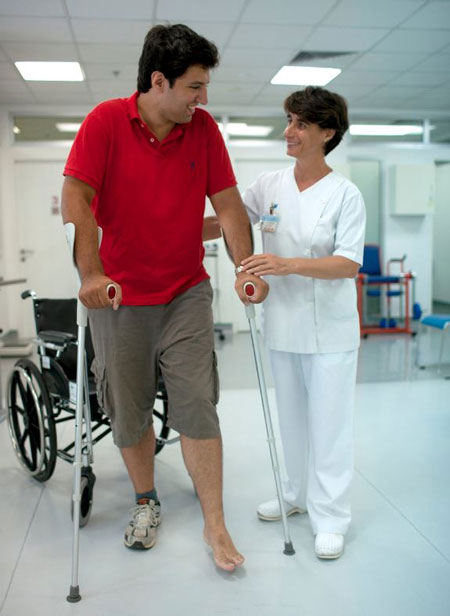“Before any surgery, I always ask myself two questions: If they were my parents, my relatives, how would I perform the operation? If I were the patient, what would I expect to be treated?”

More than 20 years established his reputation of orthopedic surgery domain in Germany, had the position of former Deputy Head of Department, General Surgery & Orthopaedics Surgery at Franziskus Hospital… there would be likely no reason for Dr. Le Trong Phat to leave such a country having the largest economy in Europe. The bond between him and Germany was tighter as his three children were born. However, when had been invited to work in FV Hospital as Head of Vascular Surgery & Phlebology Department, Dr. Phat still had the indescribable happiness – the joy of the dream coming true. The call of homeland call is always earnest in his blood, because returning back to serve the Vietnamese people “makes me feel warm and close.”
This careful well-trained medical doctor also has another important reason: “FV Hospital has the similar work culture to Germany which is modern, civilized with professional procedures which assure the best treatment for patients.” He explained that FVH has set a very clear mission that every patient must receive the most scientific and safest treatment. To fulfill that mission, the hospital must adhere to rigorous international standards, including massive work done in the backstage such as the non-stop working of the anti-infection committee, the medical team, the ethics committee, JCI quality management department, etc. Patients can’t see this numerous financial and human resource required system, but for a doctor imbued with Western work culture, Dr. Phat knows how important those are for the safety of the patients.
The old doctor and the young college student
Those who have been Dr. Phat’s patients are quite surprised with his lullaby alike soft voice. And they’re perhaps even more surprised at the passion, the eagerness of the chief doctor. Each of his gesture, speech, and manner shows respect and care as if he is enjoying a certain gift from the patients. As for me, I have found myself especially as the patient of his early life, whose presence, for the first time, is putting him from a graduated freshman to a position of the respectful doctor. There were times I forgot the thing that in front of me was a famous medical doctor who has nearly 30 years of experience!
“How can a doctor who has been spending every day to examine, surgery, to hear patients complaining and receive many pressures for nearly 30 years still kept the gentle manner and the eager expression?” I asked Dr. Phat in the third visit. With his soft voice and glittering eyes, he explained: “Once contacting the patient, that’s a gift for me as I have a chance to talk and get to know people. In addition, if you want to cure the disease, you must know enough information about the patient. To do that, you must be friendlily and close to the patients so that they feel ease and confortable to share everything. If the doctor do not open the door first, it will be forever closed and he can never get inside, meaning that the disease can’t be found in the most accurate way”.
A sympathy heart

Appreciation and listening also helps him to make his best efforts to meet patients’ expectations to the maximum extent permitted by the medical profession. For example, when he operated on hip replacements for a 40-year-old woman who had fallen from a tree and has been suffering from hip dislocation from a young age, her dislocated leg retracted 6cm caused difficulty and pain when she walked. It was a particularly difficult case because after replacing the hip joint, he also needed to ease the ligaments and muscles which have been retracted for 30 years. Besides his profound knowledge, experience and skillful hands, the medical doctor decided to perform the surgery with a sympathy heart that always listens. He recalled: “At that time, she intended to get married so she hoped to be able to walk without pain to take care of her family.” Then he smiled contentedly:
Looking at his prideful eyes, I partly get to know the joy of great reward that only those who wear the white blouse might fully understand.
The case of 14-year-old boy, Do Trong Hieu, which made the medical community respected, was another great success of Dr. Phat’s career. Hieu was suffering from a congenital deformity of his knee joints which meant that he could not walk because his legs were unable to straighten and bend properly. His patella was completely dislocated while the tibiofibular joint was partially dislocated. The patellar tendon and some ligaments had become stuck together, the anterior and posterior cruciate ligaments were stretched and torn, and the lateral meniscus was missing. After being refused to treat by many hospitals, Hieu’s family brought him to FVH. After consulting with some doctors in Australia, they recommended leg amputation and an artificial leg (prosthesis) to be done to regain Hieu’s ability to walk. Dr Phat sent Hieu’s medical records to international professors and doctors in Germany, but all advised him to be careful because this case was not only complicated but also extremely rare. After discussing in details with Hieu’s family, Dr. Phat made a brave decision with his compassionated heart: to operate and keep Hieu’s legs. The ligaments were dissected from the muscles; then the patella was moved and repositioned. Doctors then reconstructed the cartilage, loosened the muscles and tendons, and realigned the tibia bone. After 3 months of physiotherapy, Hieu was able to walk on his own legs without the support of crutches.
“The life-time legs”

Being asked that “how dare you to take that risk?” he gave us a gentle reply in return: “I had to very carefully consider and review my ability, experience and knowledge if I were capable for the successful surgery. Once I knew I could, I thought, why I did not try my best to keep his legs before I cut them off? They are the legs of a whole life long”. But it was not that simple. What about his reputation and the career had been built up the life of a doctor, also the reputation of the famous hospital as well? Rejecting the case or amputation would be a safer solution for the doctor and the hospital. But he never ceased to apply the principle he makes for himself:
Perhaps, therefore, he understood the pain of losing the leg and tried to keep it back despite facing great difficulty and pressure.
That particular principle has been endorsed by the FV Hospital leadership, because it is fully compatible with the general principles of the hospital: the patients’ safety and quality of life is above all.



